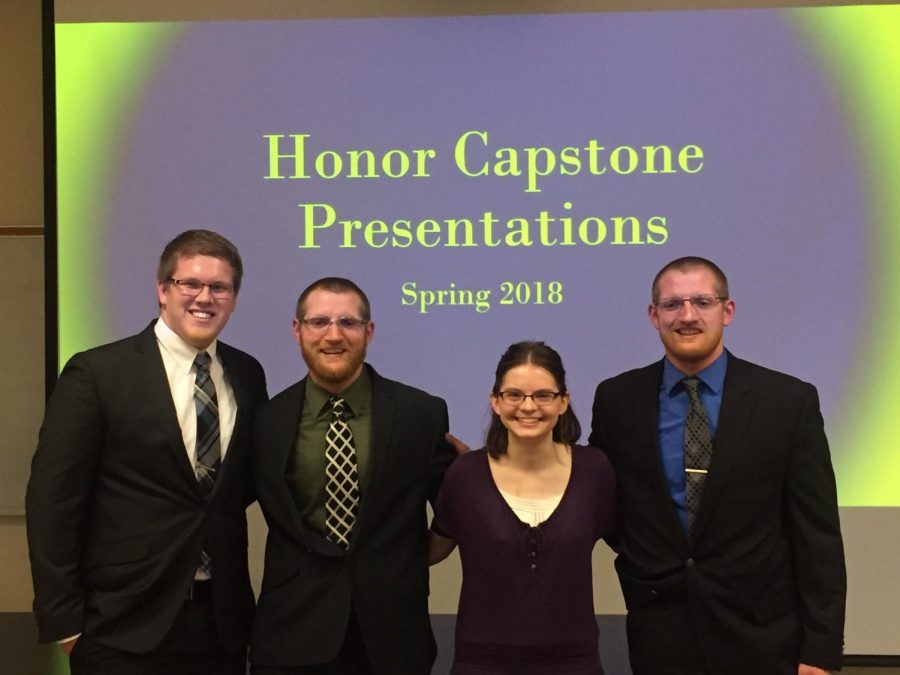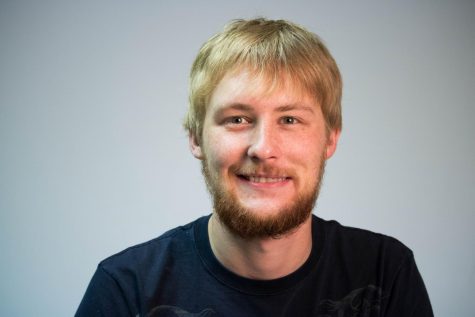Honors students present final projects
May 1, 2018
Last Wednesday, April 25, the latest group of Honors students presented their research projects. After several semesters of designing, conducting, and reporting on a research project of their own design, Honors students Gage Cook, Tanner Cook, Ranelle Irwin, and Jacob Staudt presented the results of their projects to a crowd of professors, Honors committee judges, parents and friends, and fellow Honors students.
This semester, four Honors students presented on a variety of topics. Gage Cook, a senior environmental science and political science double major, gave his presentation “Of Flowing Oil and Policy Streams: The Standing Rock Sioux Confront the Dakota Access Pipeline,” examining the approach taken by the Standing Rock Sioux through a variety of political science approaches. His project suggested ways the Standing Rock Sioux could have improved their approach, and what factors stood in their way.
Tanner Cook, a senior environmental science and biology double major, presented his project “Inoculum: An Essential for High Legume Yield,” testing the effects of fertilizer on Rhizobia, bacteria essential for nitrogen breakdown in soil. While the results of the intended study failed, his research did provide data on optimal fertilizer levels for the tested plants.
Ranelle Irwin, a senior English major, presented “Effects of Short-term Study Abroad on Japanese High School Students,” examining the effectiveness of the study abroad program offered by Buena Vista University for Japanese high school students. Her study also suggested improvements for the program.
Jacob Staudt, a senior biology major, shared the results of his project “Experience of the Sodium Iodide Symporter in Different Cell Types,” drawing conclusions about the potential use of this approach in cancer research.
A selective program based on academic performance, the Honors program has been run by Dr. Thomas Bonagura for the past three years alone, and the two years before that with Dr. Kampbell. Honors students are given the opportunity to access advanced general studies courses, priority registration, and to plan and execute a multi-semester research project under the guidance of a faculty advisor. While many students perform research projects within their own major, Bonagura shared that some of the best projects he has seen have come from students working outside of their majors.
Both Bonagura and the Honors students who presented feel that the program has helped to expand the horizons of the students in the program. Staudt appreciated the way that the discussion-based Honors courses allowed him to get more out of a class.
“I feel more confident in my academic approach,” he said.
Irwin agreed, adding that the program has been, “a way to challenge [him]self,” and that the Honors courses have been an opportunity to get more in depth with other disciplines.
The final project seems labor intensive to many starting out in the program, but Bonagura feels that the project pushes students to learn things they otherwise wouldn’t in classes.
“It offers them an opportunity to see what they can accomplish as an individual, rather than exceeding in a class,” says Bonagura.
Irwin, who conducted a project outside of her major, agreed, finding that, “Honors was a way for me to tap into that methodical, more scientific side of myself.”
Bonagura adds that as much as the program can offer students, there are still many who back away from the program due to the intensity of the final project, and he feels they make a mistake in doing so.
“It is easily accomplishable and much more in your grasp than you’d imagine, and I think people make the hill steeper and back away from it,” says Bonagura.
Staudt agrees, stating that as much work as the final project can be, “it’s worth it in the end.”








